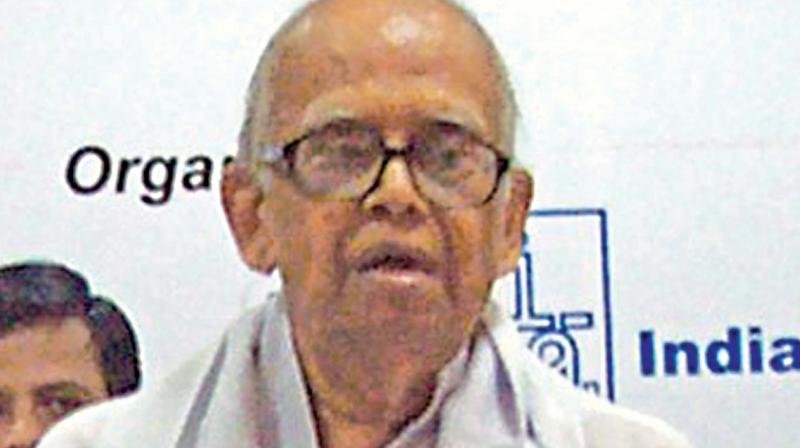Dravidian movement loses its Polly Umrigar
Sezhiyan's extraordinarily long innings in Parliament was as brilliant as Polly Umrigar's run getting.

Chennai: When veteran Parliamentarian, Constitutional expert and a stickler for democratic institutions, Era Sezhiyan passed away in Vellore on Tuesday at the age of 94, in cricketing parlance it was like the Dravidian Movement losing its Polly Umrigar.
In retrospect, it looks both shared certain noble traits though shining on radically different turfs. Not only was Polly Umrigar, born in Sholapur in Maharashtra, one of the all time greats of Indian cricket, dominating the cricket scene for nearly two decades till the early 1960s’, never wanting in performance when the country needed it most, and excelled even as a bowler and fielder, Umrigar was known to be a perfect gentleman of the game.
Though cradled in the ideology of the ‘Dravidian Movement’ from his student days, Sezhiyan, a member of both the Lok Sabha and Rajya Sabha for close to 22 years, after having emerged as one of the brightest student-leaders, along with late V.R. Nedunchezhiyan and Prof K Anbazhagan as products of the Annamalai University and drawn by the charisma of the late DMK leader C N Annadurai, he also chaired a sub-committee with the late Murasoli Maran on the famous ‘State Autonomy’ report here.
Sezhiyan’s extraordinarily long innings in Parliament was as brilliant as Polly Umrigar’s run getting. At least three of his contributions stand out in enhancing the working of democratic institutions and values. Rooted in regional aspirations, State Autonomy and Federalism, for which the DMK has stood for, he never lost sight of the larger national perspective. In fact, one of Sezhiyan’s enduring contributions as a member of the Lok Sabha in the mid-1960s’ was when the Central government tried to make Hindi alone as another medium for writing the UPSC exams.
Sezhiyan flagged the issue in a big way in the Lok Sabha in August 1966, raising a discussion against the move, that led to the then Deputy Minister for Home Affairs, V C Shukla, assuring that in addition to English, all National languages listed in the seventh schedule of the Constitution, would be allowed to be the medium for taking the UPSC exams. “That settled the issue,” recalled Sezhiyan years later.
Sezhiyan explained that he was not against Hindi, but against “discrimination” of other Indian languages, and against “unwarranted decisions” by the Central government that could “damage the harmony and rapport prevailing among linguistic groups in the country.” That singular Parliamentary effort by Sezhiyan helped more youths from Sates like Tamil Nadu join the national mainstream through the UPSC examination.
Again in the 1980s’, when Sezhiyan, who by then had joined the Janata Party after having closely worked with the late Jayaprakash Narayan in opposing the Emergency and won his confidence and respect, ensured that members of Parliament did not lose out on one of their basic rights, the freedom to move around, after the chilling Emergency.
In August 1983, when Sezhiyan and his Janata party colleagues in Chennai had been arrested for attempting to picket the Post and Telegraph office here as part of the agitation to condemn the Central government’s failure to protect the Sri Lankan Tamils from the “horrid atrocities” perpetrated against them by the Island-government, the police had failed to inform about his arrest to the Rajya Sabha Chairman then.
Sezhiyan promptly took up the issue shortly later in Parliament– he was a member of the Upper House then- about the Chennai police not communicating about his “arrest” to the Rajya Sabha Chairman, though “I am not taking it (personally) seriously.” But his concern was that it should not become a “precedent” for not keeping the House informed, “even if a member is detained for months together”. The Chennai police had then taken the view that Sezhiyan and others were not “technically arrested”.
Era Sezhiyan’s third most outstanding contribution to strengthening India’s democratic legacy, as even the senior BJP leader L.K. Advani hailed, was compiling and re-publishing the “lost” three volumes of the Shah Commission Report on the Emergency excesses as “Shah Commission Report – Lost and Regained” in December 2010.

